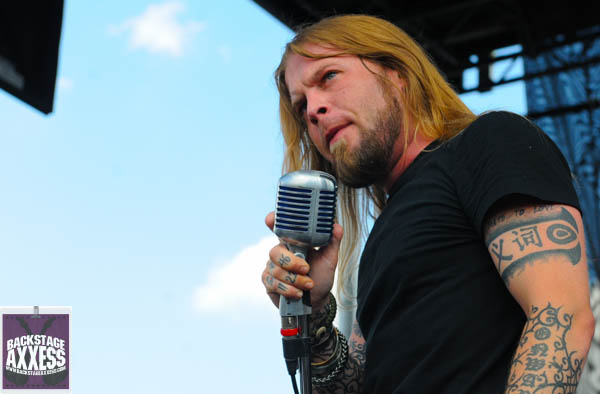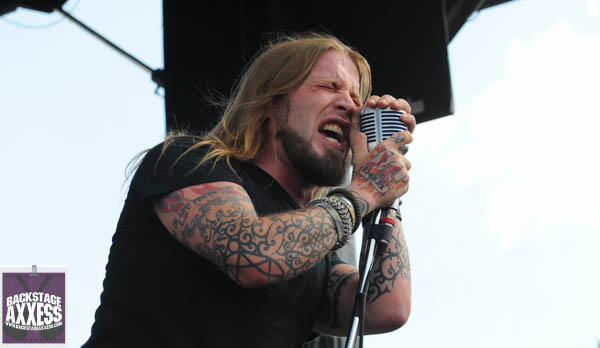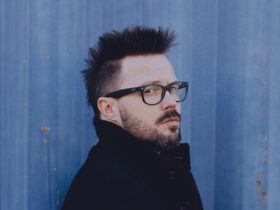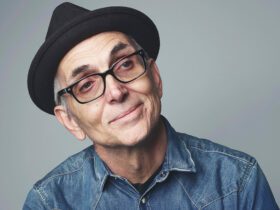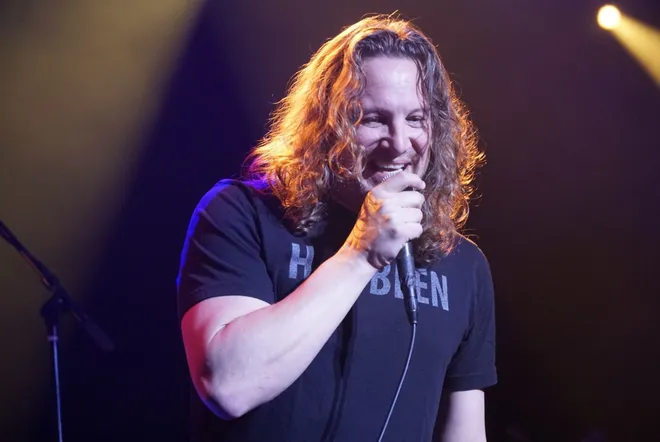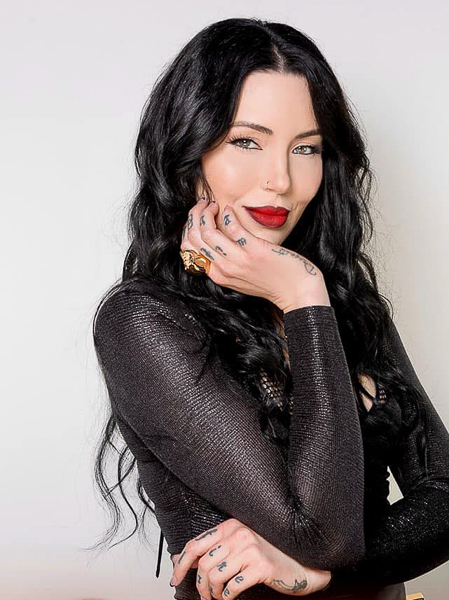With the 2001 release of their major label debut, “Scars,” heavy metal band SOiL seemed headed for rock and roll success. As we all know things don’t always work out the way we plan and the band was forced to deal with the departure of lead vocalist Ryan McCombs in 2004. After spending years with Drowning Pool, Ryan is back with SoiL and is currently touring in support of their latest record, “Whole.” I had the chance to talk with Ryan about the new record and tour, and what brought him back with SOiL after so many years. Let’s see what he had to say.
KE: Hello Ryan! How are you?
RM: Good, how are you doing?
KE: I’m good, thanks for asking and thanks for taking the time to talk with us here today.
RM: Oh no, thank you.
KE: Looking at your career, things seem to have come full circle for you, leaving SOiL and joining Drowning Pool and now back with SOiL. How does it feel to be back with the band?
RM: It’s good you know. The time away I think it allowed all of us to try and have that well, to have that time away. We spent so much time in the early days on the road together. We toured like real road dogs back in the day. Out of the first 13 months after the release of “Scars” I think we tallied up two to three weeks of time off that we actually had, actually in our own beds in our own homes. We spent every waking day together so I think the time away, it was just really exactly what we needed as human beings. We have a lot of fun together now. I mean we did a lot of growing up. We realize what’s important and realized that the little trivial things that used to get on our nerves aren’t so important. We have a lot of fun now.
KE: Now after so many years playing with Drowning Pool, what was the reason for your departure from that band?
RM: You know it’s just me. I’ve got like this seven year itch thing. I was in SOiL for seven years. I was in Drowning Pool for seven years. I was married for seven years. It just, honestly I’m a small town guy. I grew up in a small town in Indiana and the music industry is a pretty disgusting business. I think any big business is a pretty disgusting business probably when you delve into it. The music industry has just a lot of shady people involved in it. I just can’t really stomach that type of person and being infested with so much of it. Sometimes you just need to step away and re-energize the old batteries and just get away from it for a little bit; which has happened to me too many times now. You need to step away from it and go back home and remember that people can generally be good but it just doesn’t seem to be an industry that has much of that quality.
KE: Understood. Do you have any relationship with the guys in Drowning Pool now? Or did you just go your separate ways?
RM: I mean I don’t have any of them in my life that I keep in contact with but when we see each other it’s fine. We did a few different festivals together since we parted ways and each time we just had a blast hanging out. The last one we did together, a festival we did this last summer, I’d get up on stage and I did “Bodies” with them at the end of the show and just had a good time. But yeah, we still have a good relationship. We were on the same bus and everything.
KE: OK, now that I’ve asked the uncomfortable questions, let’s talk about the latest SOiL record, “Whole.” Now, the title seems a good fit for your first album back but I wanted to ask about the album cover itself. I noticed the words on the cover, similar to the five stages of loss or grief-denial, anger, pain, depression, and acceptance. What is the significance of having those particular words on the cover?
RM: A lot of that music, I mean I’ve always been one as a lyricist goes, I’ve always sang, written about things that I’ve experienced in my own life in the hopes that people can relate to it. People can hear something that they can relate to in their own life. I think we all experience the same things every day. I’ve never been one to, well like, I’ve never been a James Hetfield or a Bruce Dickinson, that can write about like a book that they’ve read or history or something. I’ve never been one to be able to do that. This album, like anything I’ve ever done, comes from just what I’ve been going through when I was writing that music, when I was writing the lyrics. This album comes from a time near the beginning of when me and Adam and Tim started writing together. At that same time, I was in this (personal)relationship that was just awful. It was abusive on every level but it was towards the end of it. So there was that process of being in it, seeing it for what it was, realizing what it was, and getting over it, getting through it, and getting beyond it. The album for me, when I listen to it, especially the way the album is arranged like a story format, is the process of experiencing that part of my life, those words. It’s a process of getting over something, the process of grieving or acceptance and all that, just getting over it. But that had a lot to do with the inner meaning of those songs to me.
KE: So as far as the writing process goes, you’re responsible for the lyrics? And Adam comes up with the music? How does that work?
RM: Yeah exactly, that is it exactly. Tim brings stuff to the table. He’s always good for a tune or two. But Adam’s always been the heart and soul of SOiL. I mean people were like it wasn’t the same band when you were gone. And I appreciate that but at the same time for me, SOiL has always been Adam Zadel. He is the primary force. I can’t write lyrics to something that isn’t there and being in bands like SOiL and Drowning Pool, I had the opportunity to have great musicians like Adam and like C.J. Pierce to work with. It made my career because I couldn’t do anything without those guys. Those guys are the ones that write the music. Adam is the main cog when it comes to the machine that is SOiL.
KE: Now this record is the first independent effort by SOiL. What led the band to go in that direction and how did that make the whole process different?
RM: Well you know, we’re all sitting here blessed in the fact that 16 years later we’re still doing this. I mean SOiL’s name is stil sellable. We still have the opportunity to do what we do because people out there give us the time of day. To still be able to do it is just amazing. But we were sitting there and we did this 10th anniversary tour of the album “Scars” while we were over in the UK which is kind of what started the whole us getting back together. And then when we got back, we started talking about should we do another record? We have it in us. And the more we talked about it the more we realized we were all on the same page 16 years later being able to do this. We’ve been screwed, sorry, we’ve been messed over every way possible and if we were gonna do it again, if we were gonna do another SOiL record, we wanted it on our terms. We wanted to call the shots. We wanted to make the decisions. When you’re sitting with a label, you’re being stretched and pulled in every direction. You’re being told what the single is. You’re being told how you’re gonna market it, how your plays are going. You’re told just do it. At the end of the day, you’re sitting there and your pocket is empty and there’s somebody sitting there shrugging their shoulders saying “Oh, I guess we messed up.” We just were all on the same page. We knew that if we were going to do another SOiL record we wanted it to be done by us. We wanted to call the shots. We wanted to make the decisions. We did some kickstarter projects as well as some individual backing. We had people backing us and we were actually able to get that done The number one thing that we get from doing it this way is the album is us. In the studio, we didn’t have anybody trying to guide the ship. We were calling the shots, so it made it a very comfortable studio experience for ourselves, as well as for Ulrich Wild who produced it. Because we didn’t have to worry about sending the music off and getting it ok’d or getting someone sitting behind some desk in New York City’s approval. As long as what we were doing was what we were feeling, the result is probably the truest SOiL album that we’ve ever written.
KE: It had to be very freeing to be able to finally do things your own way.
RM: It really is. I don’t think any of us really saw what kind of work, what kind of time it was gonna take to do it this way. It’s a 24 hour a day job. I remember saying I don’t want anyone involved in this project that views their involvement in it as a job. They punch the clock in the morning and they punch the clock at 4pm. I don’t want that individual being involved in this. I want to be able to call someone at nine o’clock at night and say, “Hey what’s going on with this?” I spoke very loudly about that and I didn’t realize that that involved me too because it really is a 24 hour job. We’re dealing with licensing agreements with all these different countries in completely different timezones and it’s just a lot to deal with.
KE: I’m sure it’s a lot more work than anyone realizes. For the drum tracks on the record, you had Will Hunt (Black Label Society, Evanescence, Device) come in. How did he get brought into the mix?
RM: We knew along with everything else, we just talked about keeping it the three of us. Originally SOiL was a five piece and there can be something said about too many cooks in the kitchen. We wanted to keep it within ourselves and kind of keep the drummer side of things open. We had to bring in the hired gun as far as touring goes and when we started talking about doing a record it was well who are you gonna have do it? We started tossing names back and forth and Will is really the first name that Tim threw out at us and we’ve known Will forever. Back when he was in his original band Skrape, we did touring together on our first albums, our “Scars” album and their album came out close to the same time. So we hit the road together a lot and did a lot of touring and since then he has gone on to do drumming for Black Label Society, for Evanescence and he’s almost one of those guys where you name a band and at some point Will Hunt was the drummer for them. Just always been a big admirer of his work. I’ve never seen a drummer come in and do what he did in the studio for this album. He came in, he was done with the drum tracks for the entire album, he was done in two days. I still think he could have done it in one day but the rest of us were so tired sitting around the studio that we just wanted to go back to the apartment. He just, he killed it. It was unbelievable. He is a machine and we’re lucky enough that we had Will for the album and one of the tracks on the album was done by our touring drummer, Mitch Gable who we’ve been blessed with having on the road with us. If this lineup would have existed ten years ago, I don’t think that the band would have ever broken up or I would have never parted ways. Mitch is just, as the track on the album shows, “My Time,” he’s an exceptional drummer but also personality wise we love Mitch.
KE: OK, so Mitch is handling all the drumming for the current tour?
RM: Yes, Mitch has been with us touring wise for probably the last year at least.
KE: Speaking of tours, right now you’re playing in the States and then early next year heading over to the UK. How is that going so far?
RM: Right now we’re out with, well tonight, we have a show with Fear Factory in Nebraska and then on our way to Reno to start a bunch of dates with All That Remains and Motionless in White. We finish up the year with that and then in January we head over to the UK and then over into Europe with a band called Skindred. Then off to Australia after that. So everything is getting booked up nice, we’re getting busy and the album is keeping us going and luckily being on the road is keeping the album going.
KE: What about the setlist for the tour? I know you weren’t with SOiL for a few of the albums. Will you be including songs from those albums on this tour?
RM: Not on this run and we haven’t yet on that note. For the most part, we haven’t added anything from those two records because I wasn’t a part of it. We talked about doing a song or two but we just haven’t gotten to that point yet. At first, the guys were very much against it. I think they just wanted to forget that time but as I’ve spoken about being ok with it, I think that everyone is more and more ok with it but at this point no.
KE: I was able to see SOiL live years and years ago. I don’t remember who the headliner was but it didn’t really matter after you guys took the stage. There was such an incredible energy in the club that night, something that you don’t always get to see. What is your favorite part of performing live?
RM: I think it’s those moments that you don’t expect. It’s those times when someone says something and you react. I’ve literally been on tour with bands and have been standing back at their merch and their merch guy is saying exactly what the singer is saying in between every song because he hears it every night like it’s a script. We are just not that style of band. I mean every night is different. Some nights I say something and the crowd is gonna react in a different way and there the reason I’m here and I think our live show, at least my involvement with the live show, is just an interaction with the individuals that are there. You’re never really sure what direction you’re gonna turn in. It all has to do with what is going on right there at that moment. I may say something or something somebody says or something you see catches you off guard and makes you chuckle and we all have a laugh about it right then and there. I think that’s my favorite part is just that personal interaction with the individuals in the crowd that night.
KE: Yes and that’s what makes it fun for the fans as well. Once the tour is over, what’s next for SOiL? Can we expect more Soil records?
RM: I don’t know. I don’t know. The guys have been talking here recently more and more about maybe doing some more writing. But I don’t know. When I left Drowning Pool, I didn’t really have anything planned. I didn’t see doing another SOiL record. I didn’t see doing another Drowning Pool record. I didn’t see doing another record period. So I really don’t know. Maybe another SOiL record; it all depends on how this thing goes. You can only do it while it’s still paying the bills. To be honest with you, nobody goes to work to not be able to pay their bills. So as long as this album stays on tap as it is, maybe we’ll get the opportunity to do another one. I don’t know. We’ll see where everybody’s mind is. I used the word “never” back in the day when it came to doing another SOiL record and that proved to be wrong so the future is an open door. I’m not really sure what it’s gonna hold.
KE: Fair enough. Well, the album is just a monster of a record and you definitely know how to kick it live so I wish you guys the best of luck with everything and hopefully there will be some more SOiL music for us to enjoy in the future.
RM: Thanks very much and thanks for giving me the opportunity and a way to reach the people that allow us to do what we do.
KE: Thanks Ryan!
We would like to thank Shauna O’Donnell from MUEN Magazine for setting up the interview with Ryan. For more information on the new SOiL CD “Whole,” or just SOiL in general, please go to Soil.

